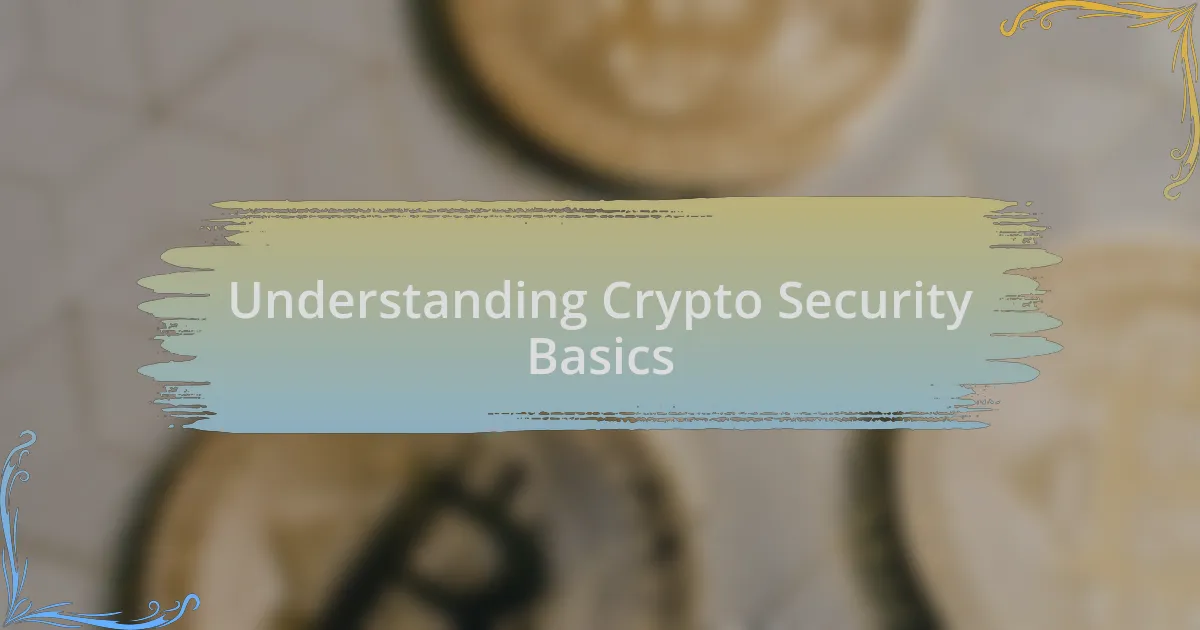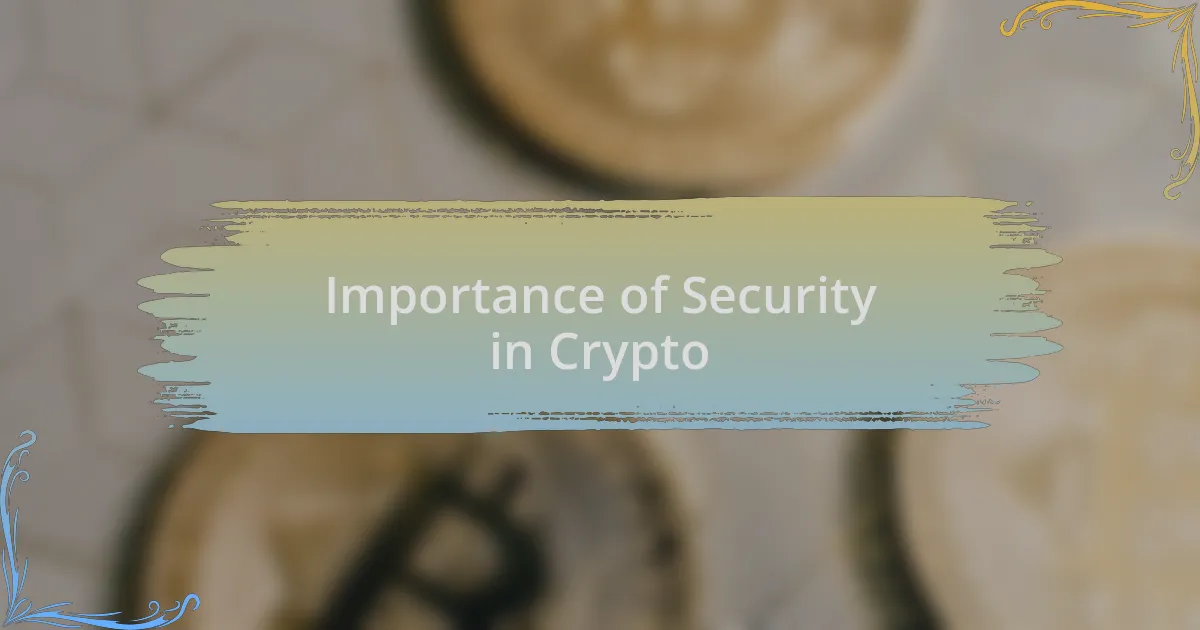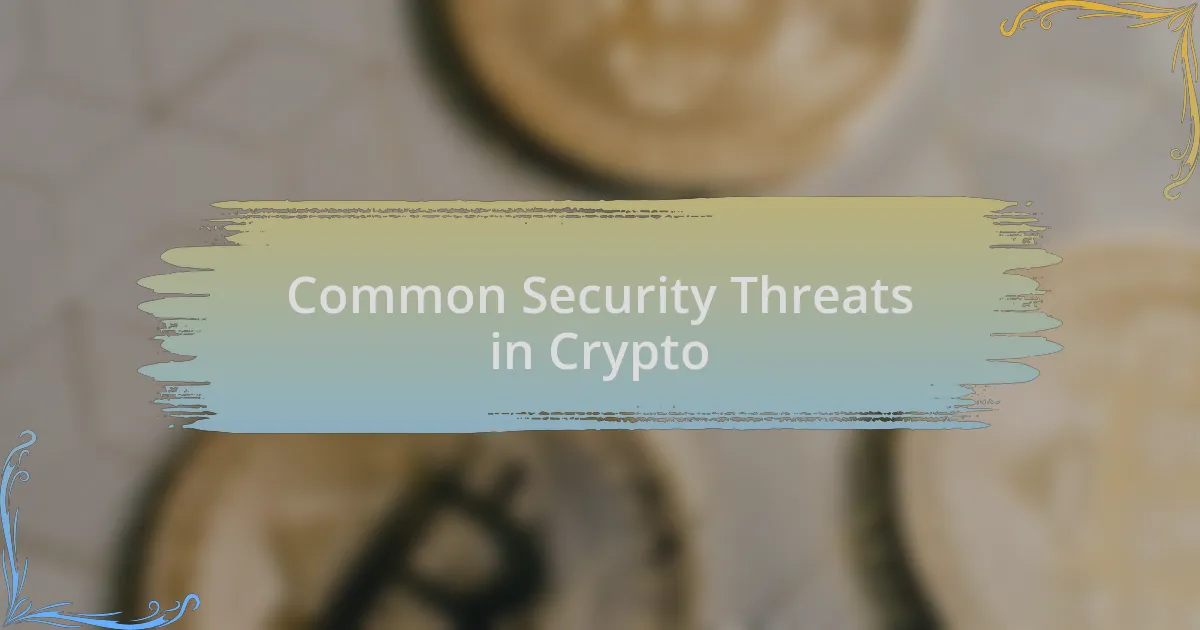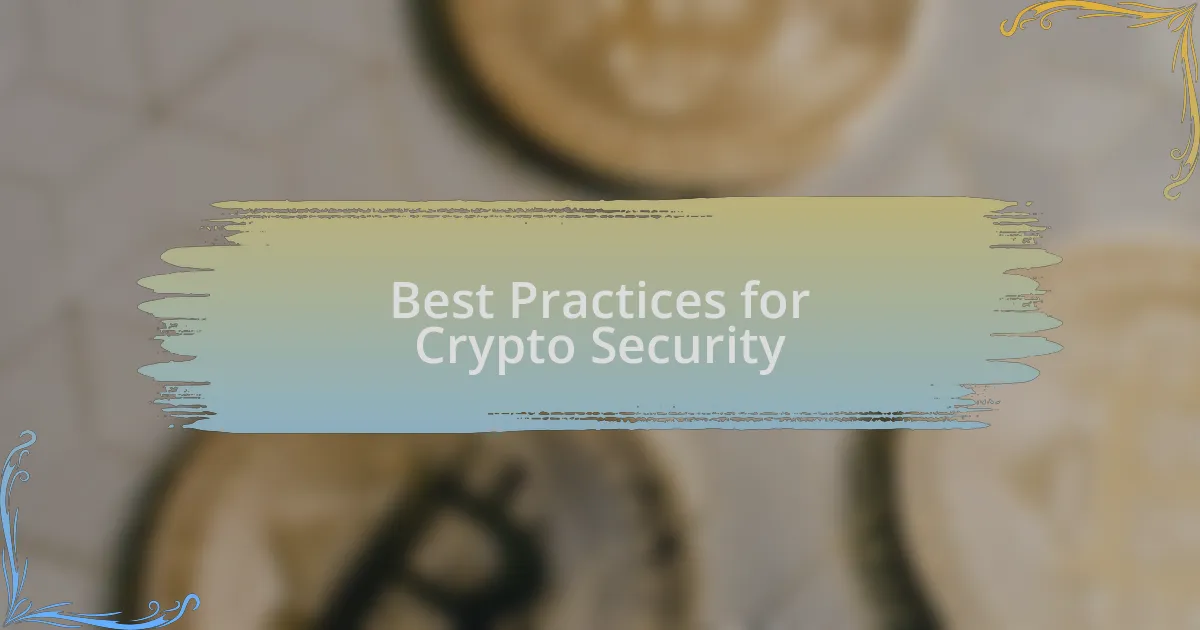Key takeaways:
- Strong passwords and private key confidentiality are fundamental for securing crypto assets.
- Implementing two-factor authentication (2FA) significantly enhances account security.
- Awareness of phishing attacks and scams is crucial to avoid falling victim to fraud.
- Using trusted exchanges and keeping software up-to-date are essential best practices for crypto security.

Understanding Crypto Security Basics
When I first started exploring the world of cryptocurrency, I was overwhelmed by the importance of security. I remember setting up my first wallet and feeling a mix of excitement and fear—would I keep my coins safe? Understanding crypto security basics is like learning to ride a bike; at first, it feels daunting, but with the right knowledge, you can confidently navigate the ride.
One vital aspect I discovered is the significance of strong passwords. I’ve witnessed friends lose their investments due to weak passwords. It’s a stark reminder that even the best technology can be vulnerable—security starts with us. Have you ever considered how you create passwords? I learned to use a mix of letters, numbers, and symbols, making it an almost impenetrable fortress for my crypto assets.
Another critical lesson revolves around keeping private keys confidential. I recall a moment of panic when I nearly shared mine, thinking it was no big deal. That experience taught me the value of discretion in the crypto space. Ask yourself: would you hand over your house key to a stranger? Protecting your private keys requires the same vigilance. Always remember, your security in crypto is only as strong as the weakest link in your strategy.

Importance of Security in Crypto
Security in crypto is not just a technical issue—it transcends into personal responsibility. I vividly recall the first time I heard about a friend’s account being hacked. The disbelief and frustration were palpable as they recounted the experience, knowing that a few simple security measures could have saved their investment. Have you ever thought about how one small oversight can lead to significant consequences in the digital world?
One thing I truly value is the importance of two-factor authentication (2FA). I implemented it on my accounts after reading about someone who lost everything because they didn’t. That extra step feels like having a trusted friend ensure the door is locked before leaving. It may seem like an inconvenience at times, but I’ve learned it’s a crucial tool to maintain peace of mind.
Additionally, I’ve found that staying educated about potential scams is vital. More than once, I’ve encountered emails posing as legitimate exchanges, trying to fish for personal details. Each time, I remind myself of the old adage: “If it sounds too good to be true, it probably is.” What strategies do you have in place to avoid falling into common traps? Taking proactive measures can help prevent regret down the line.

Common Security Threats in Crypto
When diving into the world of crypto, I quickly realized that phishing attacks are surprisingly common. There was a time when I received a message claiming to be from my exchange, asking me to verify my account. The fear of losing access almost made me click the link! Thankfully, I remembered to double-check the sender and realized it was a scam. Have you ever caught yourself in a situation like that? It’s a stark reminder of how crucial it is to scrutinize every communication.
Another prevalent threat I’ve encountered is the risk of using weak passwords. I used to think that a simple password was enough until a friend shared their horror story of losing funds due to a simple hack. They had used “123456” as a password—can you believe it? It made me rethink the importance of creating complex, unique passwords for each account. I’ve learned that using a password manager can help keep my accounts secure while making it easier to manage. What about you? How unique or complex are your passwords?
Lastly, I’ve become acutely aware of the dangers posed by unregulated exchanges. I remember hearing about a platform that abruptly shut down, leaving countless users stranded. The uncertainty and panic that followed could be felt in the community. It really drove home the point that not all platforms are created equal. Researching the exchange’s reputation and security features goes a long way in protecting my investments. What steps do you take to ensure you are using a trustworthy platform?

Best Practices for Crypto Security
One of the best practices I’ve adopted is enabling two-factor authentication (2FA) on all my accounts. It adds an extra layer of security that has saved me a couple of times. When I log in, I always recall that anxious moment when I was prompted for a code sent to my phone; I felt such relief knowing that even if someone had my password, they couldn’t access my account without that code. Have you set up 2FA on your accounts yet?
I also learned the importance of keeping my private keys safe. Early on, I stored them on my computer without any thought, only to realize how vulnerable that made me. It was a wake-up call when I discovered that many users store their keys in hardware wallets. These wallets are like a safe for your digital treasures, keeping them offline and away from prying eyes. What measures do you take to keep your private keys secure?
A practice I can’t stress enough is keeping my software up-to-date. I used to ignore those pesky update notifications until I learned about vulnerabilities that can arise from outdated applications. Once, a minor update protected me from a significant exploit that had affected many users. It made me realize how crucial it is to stay updated; after all, those updates are there to protect us! How often do you check for updates on your devices?